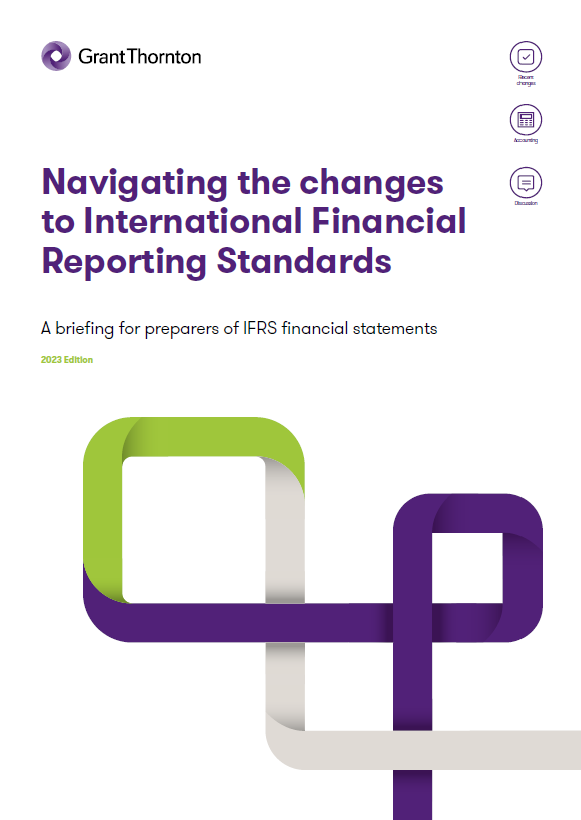-
Audit methodology
At Grant Thornton, we use a single audit methodology across our global network. This means that our clients gain the same proven, high-quality approach wherever they are.

-
Financial statements and consolidated financial statements
Preparation of monthly, quarterly or annual report and consolidated report on the basis of information presented by the client.
-
Financial Accounting
Effective bookkeeping and financial accounting are essential to the success of forward-thinking organisations. To get the optimum benefit from this part of your business, you'll need an experienced team behind you.
-
Tax compliance
Tax is likely to have an impact on almost every business decision you make. Whatever your business’s specific needs, we respond quickly and devise solutions tailored to you. We perform VAT, income tax, social tax and other tax accounting as well as present tax declarations to the tax authorities.
-
Chief financial officer service
Chief Financial Officer services include the periodic reporting, information systems standardization, internal document management and information flow optimization, budget preparation, cost accounting, cash flow and working capital management, financial analysis, investment return evaluation for managers.

-
International taxation
Grant Thornton operations in the Baltic States give us an access to the international expertise and allow advising the client on the minimisation of tax risks arising from conducting business in a foreign tax jurisdiction. We also consult foreign investors in finding an optimum group structure and form of enterprises in Lithuania and other Baltic States.
-
Transfer pricing
We advise the management bodies of local and multinational groups of companies in issues concerning transfer pricing of intra-group transactions and, if necessary, in the preparation of the relevant compliance documents. We also assist in preparing transfer pricing policies in order that future transactions are priced in accordance with the local as well as international regulations.
-
VAT refunds
We advise foreign clients in issues concerning the refund of value added tax paid in Lithuania, and Lithuanian clients – in the refund of value added tax paid in the EU member states. If necessary, we carry out these procedures on behalf of the client.
-
Profit tax, tax incentives
Our tax advisory department consults local and international clients in both everyday and specific taxation issues related to business activities.
-
Due diligence
Making the right investment decision can have a significant impact on shareholder value. To make an informed investment decision and create the best value from the transaction you will need the following an understanding of the target business identification and understanding of key business drivers an understanding of all the relevant issues clear analysis, conclusions and recommendations.
-
Assistance and representation during tax investigations, inspections, disputes
We provide services for registration in the Register of Taxpayers and the Register of VAT Payers. We represent clients' interests in tax disputes at the State Tax Inspectorate, Tax Disputes Commission, courts and other institutions.

-
Legal advisory for business start
We assist to quickly establish a company, branch or permanent establishment in Lithuania, open a bank account, VAT registration and obtain all necessary licenses for activity.
-
Legal advisory for business development
Our team has gained the greatest experience in advising international companies on the management of groups of companies. We advise and implement reorganizations or liquidations. Together with a team of tax and financial advisors, we perform a comprehensive due diligence (tax, legal & financial).
-
Labor law for CEOs and employees
We provide modern labor law solutions for the CEO, C-level managers and employees, which are tailored specifically to your business industry. We will take care of well-judged employment contracts and benefits package, protection of confidential information and non-compete agreements, handling of employee data or stock option rules, posting of employees, employment of EU and third-country nationals, organization of telework.
-
Fintech
With extensive experience in money laundering prevention and compliance and a strong team of financial experts, we advise clients on financial services, electronic money, licensing of payment institutions, capital formation, listing of mutual lending platform operators and other operational issues.
-
Migration and relocation
We assist you, your family members and employees of the organization to obtain national and European Union (Schengen) visas, residence permits, e-resident status, provide mediation letters and ensure a smooth relocation to Lithuania.
-
Due diligence
Making the right investment decision can have a significant impact on shareholder value. To make an informed investment decision and create the best value from the transaction you will need the following an understanding of the target business identification and understanding of key business drivers an understanding of all the relevant issues clear analysis, conclusions and recommendations.
-
Fintech advisory
The rapidly changing world and evolving technology are driving the development of new business models such as acting as a payment institution, a provider of virtual currency services and a financial institution. Grant Thornton Baltic provides support and advice to these companies.
-
Corporate finance management
Building a successful business requires a clear vision backed by a focused strategy. To achieve this vision, businesses must negotiate an increasingly complex environment.
-
Business Valuations
Choosing the right valuation method is the most important element in the process of estimating the fair value of a business as it must be adequate in terms of the purpose and object of the valuation. Grant Thornton uses only proven and generally accepted methods from among the wide range of income, asset and market approaches. Having conducted a preliminary analysis of the object and purpose of the valuation, we identify the method that will be the most appropriate considering the situation and characteristics of a given enterprise and the business sector in which it operates. Prior to commencing valuation, we also identify the documents necessary in the process.
-
Mergers and acquisitions
We provide advice to clients in all material aspects of the process of conducting transactions: finding a candidate for buyer, purchase or merger, initial analysis and valuation, negotiations, due diligence, structuring transaction price, preparing legal documentation and formal closing of the transaction. We also provide consultation for management buyouts.
-
Protection of Interests of Bondholders'
Grant Thornton provides bondholders' advocacy and protection services. We have resources, knowledge and the latest technology. Defending the interests of bondholders · Representing the interests of bondholders
-
External Financial Management Services
Providing an external financial management services makes it possible to manage a company’s finance on a day-to-day basis by a competent economist, without the need of offering full-time employment. By cooperating with experts on managing big-budget projects, we provide our clients with excellent support in comprehensive management of company’s finance.
-
Training
Financial Management Training and Seminars. Our experts have significant regional competence and close co-operation with our global colleagues. They happily share their expertise with our clients.

-
Internal Audit Services for Financial Sector Companies Licensed in Lithuania
Internal audit services adapted to Lithuanian financial sector companies ensure compliance with regulatory acts, risk management and operational excellence.
-
Internal Audit Services for EU/Foreign Aid Projects
Internal audit for EU/foreign aid fund projects helps to ensure compliance of activities and related costs with requirements.
-
Internal Audit for the Companies Certified by ISO
Internal auditing ensures ISO standard compliance, evaluates management system effectiveness, and gathers objective evidence of performance.
When providing comprehensive services, including legal, tax and financial assistance, we have the opportunity to perform a detailed assessment of the condition and potential risks of the company to be acquired or sold (asset-liability ratio, security obligations, possible claims, etc.).
Due diligence provides a detailed overview of the company. Due diligence is an important part of every purchase transaction, helping investors to take a closer look at all aspects of the company before the planned transaction. The information gathered during due diligence is also used in negotiations and helps to identify the risks to be hedged in the sales contract.
Due diligence is a thorough business financial, tax and legal analysis of the acquired company. As a result of the analysis, we will prepare a report that provides a detailed overview of the audited company so that you can make an informed decision. This allows for a better understanding of the company's business model and key growth factors, the risks identified in the analysis and recommendations for dealing with them. The information gathered during due diligence will also be used in negotiations.
The extent of due diligence depends on the transaction and the controlled entity, but may focus on, for example:
- Quality of earnings - validating management adjustments, considering findings in the due diligence and one-off items, and the impacts of accounting estimates;
- Historical trading results - analyzing growth drivers, top customers, revenue and margin development per client, segment or product and KPI’s relevant to the field;
- Analysis of net debt to identify potential debt-like items and the seasonality and requirements of working capital;
- Quality of financial and management reporting - commenting on the finance functions and controls, reporting and budgeting process etc.
Due diligence directions:
Financial analysis
A financial due diligence differs from an audit of financial statements in that it analyzes and explains the causes and drivers of changes in financial performance and business performance.
Legal due diligence
Legal due diligence looks for information about the business to make sure the investment or purchase is worthwhile. The purpose of the investigation is to reveal all relevant facts and possible liabilities.
Tax analysis
The purpose of the tax analysis is to assess whether the company's current situation corresponds to Lithuanian or foreign tax norms. Tax experts perform premium analysis, identify tax risks and review historical tax archives.
Subscribe to the GTB newsletter
Subscribe to audit, accounting, tax, legal and business advisory news. be the first to receive Grant Thornton Baltic news, advices of experts, professional business insights and information about future events.

